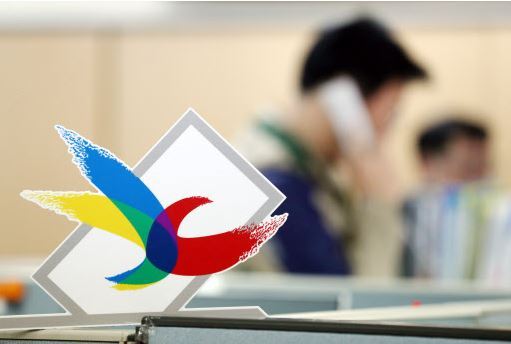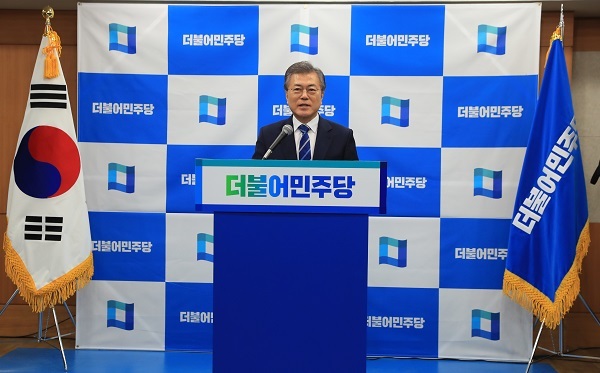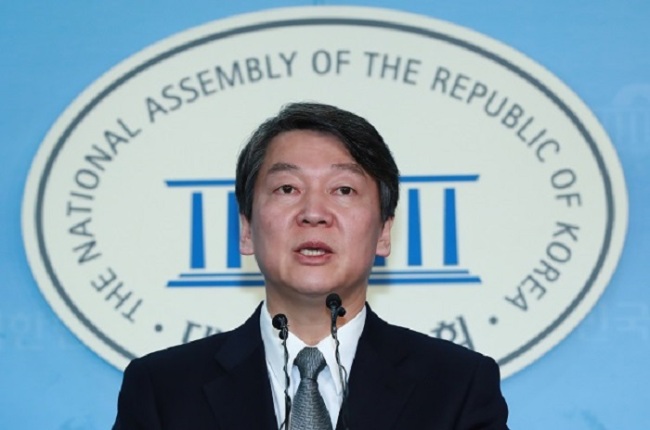[Election 2017] The big picture: South Korean presidential race
A look at who’s running or likely to run across political camps
By Korea HeraldPublished : March 12, 2017 - 19:46
With President Park Geun-hye expelled from office, South Korea’s political parties are jockeying for the next presidential election, just two months away.
The latest polls project a clearly left-leaning electorate, with three candidates of the main opposition Democratic Party of Korea together earning nearly 60 of voter support.
The Korea Herald takes a look at who is running or likely to run in each of the country’s major political camps, presenting a big picture of the 2017 presidential race.
The latest polls project a clearly left-leaning electorate, with three candidates of the main opposition Democratic Party of Korea together earning nearly 60 of voter support.
The Korea Herald takes a look at who is running or likely to run in each of the country’s major political camps, presenting a big picture of the 2017 presidential race.

The liberal left
After successfully leading the campaign to oust former conservative President Park Geun-hye, South Korea’s liberal left aims to carry on the momentum to seize power.
So far, polls show that this group, led by the Democratic Party of Korea, has a good chance of attaining that goal.
In the latest survey by Realmeter on Saturday, the Democratic Party garnered support of 45.7 percent, a figure far beyond any other political group.
The centrist People’s Party came in second with 11.5 percent, followed by the far-left Justice Party at 8.6 percent. Park’s conservative Liberty Korea Party saw a big drop of 6.6 percentage points to stand at 6.9 percent, while the splinter conservative Bareun Party struggled in last place at 5.4 percent.

On top of that, the Democratic Party’s presidential hopefuls dominate the early race, with the top three together garnering 60.2 percent of public support.
The liberal party will select its presidential flag-bearer through four rounds of voting to take place from March 22 to April 3. If there is no majority winner, the party will hold a runoff vote on April 8.
There are four candidates in the Democratic Party’s presidential primary contest, including Moon Jae-in, who in polls has topped the list of contenders across the aisle by a large margin.
Running for the presidency a second time, Moon even called himself a “mega trend” figure.
He served as chief of staff in the administration of Roh Moo-hyun, an iconic figure of the left.
On Sunday, he encouraged the nation to reunite after facing division over the impeachment ruling and vowed to put himself at the front of removing confusion over politics, the economy and national security.
“We will write a new history through a comprehensive reform of society. All of us need to gather power to create a new South Korea,” Moon said.
South Chungcheong Province Gov. An Hee-jung is another candidate who also worked closely with Roh. He stands as a relatively centrist figure in the liberal camp.
Although he initially appeared to be a minor presidential aspirant, Gov. An’s popularity has surged as he pledged to attract centrist voters and form a “grand coalition” with centrists and conservatives if elected.
Meanwhile, Seongnam Mayor Lee Jae-myung is a self-made firebrand politician with a sharp tongue and progressive vision. He saw his popularity grow remarkably late last year, amid the political maelstrom caused by former President Park’s scandal and her ensuing impeachment. His poll numbers, however, have stalled in recent weeks.
More left-wing than Moon and Ah, Mayor Lee has put forth basic income and labor rights as his key pledges in the upcoming election.
The party’s fourth presidential aspirant is Goyang Mayor Choi Sung, a relative unknown. He introduced himself as a politician influenced by the late liberal President Kim Dae-jung, who served in office from 1998 to 2003.
At the far left of the liberal bloc stands the minor Justice Party’s Sim Sang-jeung. Currently the only female presidential hopeful, the former party leader was the first to win the in-party primary and officially be selected as its presidential candidate on Feb. 16.
The middle ground
The centrist People’s Party aims to expand its leverage as a political middle and become a game changer in the next presidential election.
Those who have confirmed their bid to run so far are the three ranking lawmakers of the party, Reps. Ahn Cheol-soo, Chun Jung-bae and Sohn Hak-kyu. The overriding point of interest, however, is whether the party will join hands with nonpartisan centrist figures to form a “third zone” between the conservative and progressive camps.

Among such figures is former Prime Minister Chung Un-chan and Kim Chong-in, a rare high-profile figure to have first served the conservative camp before former President Park Geun-hye’s election and later the liberal opposition Democratic Party of Korea as interim chief.
So far, the People’s Party has only managed to set the basic rules for its presidential primary -- a combination of spot polls on party members and a public opinion survey in an 4-1 ratio -- but it has failed to fix a schedule.
Of its three potential candidates, Ahn is leading with 11.3 percent overall support, according to the Realmeter survey. That was the third highest among all presidential hopefuls across political camps.
Sohn ranked seventh at 2.6 percent, while Chun was not included in the poll.
Rep. Ahn, the founder of AhnLab who developed antivirus software, first appeared in the political arena in 2012 as a plausible alternative in that presidential election.
Despite initial popularity and high expectations, he was soon faced with stalled polls and growing calls to unite with the liberal camp’s front-runner Moon, which led him to abandon his candidacy about a month ahead of the election.
After the election, in which Park was victorious, Ahn joined the predecessor of the Democratic Party, but exited less than two years later to establish the current People’s Party.
His strength is support from the Honam region, referring to the longtime liberal stronghold of Gwangju and the North and South Jeolla provinces, and swing voters who wish to support neither the conservative nor the progressive groups.

Sohn and Chun, respectively a former chairman of a Democratic Party predecessor and a former justice minister under the past liberal administration, largely rely on their past fame as the opposition’s leading figures. Their single-digit approval ratings, however, pose a challenge to their presidential aspirations.
Regardless of the three-way competition within the party, however, the key agenda for political observers is whether or not Kim Chong-in will lean toward the People’s Party and boost the creation of a power group to stop Moon, a clear front-runner from the liberal camp, from cruising to an election victory.
Having defected from the Democratic Party last week, Kim is currently deemed a top-tier symbolic figure in the centrist political zone, especially among those underlining the need for constitutional revision.
Although he has pledged to remain “on his own” for a while, the 76-year-old senior politician is still viewed as a possible presidential aspirant, or if not, an influential strategist whose affiliation may sway the flow of the upcoming election.
Though he has not confirmed his bid in the race, Kim currently holds support of 2.5 percent, according to the Realmeter survey.
The conservative right
In the upcoming presidential election, the odds appear to be stacked against the conservatives.
The Constitutional Court’s unanimous decision to remove Park -- a conservative icon -- from office and the overwhelming public support for the decision appears to have further shifted the political pendulum to the left.
Still, contenders from the Liberty Korea Party, whose key members remain loyal to Park, are scrambling to extend the decadelong conservative rule for another five years, based on a small group of vocal Park supporters and, they hope, a larger group of shy conservatives.
Two parties compete for conservative votes -- Liberty Korea Party and the Bareun Party, which split from Park’s party after her impeachment in December. In public support, the former leads with 6.9 percent over the latter’s 5.4 percent, the Realmeter poll shows.
Liberty Korea Party will select its candidate for the presidential race on March 31, while the Bareun Party will do so on March 28. Both parties’ candidate selection process involves direct voting by party members and a survey of non-party members.

Leading the conservative field is acting President and Prime Minister Hwang Kyo-ahn, who scored 10.1 percent support in the Realmeter poll, the highest among conservative candidates.
Hwang, who was appointed by Park and advocated for her conservative initiatives during her suspension, faces voter hostility, with 72 percent of respondents saying he should not run in the election.
According to election rules, Hwang would have to leave his office 30 days before the presidential race, which would create yet another national leadership vacuum. He has not explicitly stated his intention to run.
Mindful of this, Liberty Korea Party’s powerbrokers have rushed to offer an alternative to Hwang -- South Gyeongsang Province Gov. Hong Joon-pyo, who placed second behind Hwang among conservative voters.
Nicknamed “Hong Trump” for his outspoken criticism of liberal bigwigs such as Moon Jae-in and Ahn hee-jung, Hong has aimed to energize conservative voters unnerved by the shocking fall of President Park.
Former Gyeonggi Province Gov. Rhee In-jae and Rep. Won Yoo-chul are officially in the party’s primary race, although their chances look slim.
In the Bareun Party contest, Rep. Yoo Seong-min is the front-runner. One of the most vocal critics of former President Park, the four-term lawmaker cast himself as a moderate middle-of-the-road candidate who combines a hard-line stance on North Korea with a more liberal approach to the economy.
Incumbent Gyeonggi Province Gov. Nam Kyung-pil is vying with Rep. Yoo for the party’s presidential ticket, while former Prime Minister Chung Un-chan, who has no party affiliation, is also widely considered a potential contender.
Their approval ratings, however, hover around the 1-2 percent range.
By Bae Hyun-jung (tellme@heraldcorp.com), Yeo Jun-suk (jasonyeo@heraldcorp.com) and Jo He-rim (herim@heraldcorp.com)
-
Articles by Korea Herald


![[AtoZ into Korean mind] Humor in Korea: Navigating the line between what's funny and not](http://res.heraldm.com/phpwas/restmb_idxmake.php?idx=644&simg=/content/image/2024/04/22/20240422050642_0.jpg&u=)
![[Exclusive] Korean military set to ban iPhones over 'security' concerns](http://res.heraldm.com/phpwas/restmb_idxmake.php?idx=644&simg=/content/image/2024/04/23/20240423050599_0.jpg&u=20240423183955)



![[Graphic News] 77% of young Koreans still financially dependent](http://res.heraldm.com/phpwas/restmb_idxmake.php?idx=644&simg=/content/image/2024/04/22/20240422050762_0.gif&u=)
![[Herald Interview] Why Toss invited hackers to penetrate its system](http://res.heraldm.com/phpwas/restmb_idxmake.php?idx=644&simg=/content/image/2024/04/22/20240422050569_0.jpg&u=20240422150649)






![[Exclusive] Korean military to ban iPhones over security issues](http://res.heraldm.com/phpwas/restmb_idxmake.php?idx=652&simg=/content/image/2024/04/23/20240423050599_0.jpg&u=20240423183955)



![[Today’s K-pop] Ateez confirms US tour details](http://res.heraldm.com/phpwas/restmb_idxmake.php?idx=642&simg=/content/image/2024/04/23/20240423050700_0.jpg&u=)